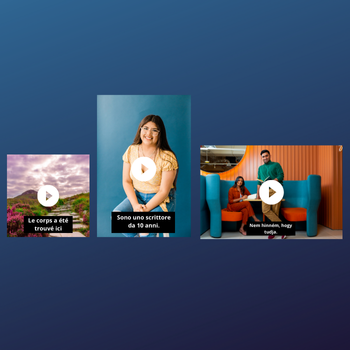Videomenthe & ProConsultant Informatique become Bminty

Learning languages with subtitles:
really?
17 June 2024
LOREM IPSUM
"Watch your TV series in original version to improve your French". If you're a parent, you've probably uttered this phrase dozens of times... Sometimes to no avail!
But does this phrase that we repeat like a mantra to our teenagers really mean anything? Can you really improve your language skills by watching films and series with subtitles? Or does subtitling add complexity to the viewing experience?
Two researchers from the University of Montpellier in France, Dominique Bairstow and Jean-Marc Lavaur, have looked into this question, and the answer is... it depends!
The impact of subtitles depends on several factors
Lorem ipsum dolor sit amet, consectetur adipisicing elit, sed do eiusmod tempor incididunt ut labore et dolore magna aliqua. Ut enim ad minim veniam, quis nostrud exercitation ullamco laboris nisi ut aliquip ex ea commodo consequat. Duis aute irure dolor in reprehenderit in voluptate velit esse cillum dolore eu fugiat nulla pariatur. Excepteur sint occaecat cupidatat non proident, sunt in culpa qui officia deserunt mollit anim id est laborum.
SED UT TUM
LOREM IPSUM DOLOR SIT AMET
Subtitles have clearly become indispensable in audiovisual content, particularly on streaming platforms. The prevalence of foreign series and films on offer has made subtitling almost compulsory in order to reach a wide audience.
Does this development of subtitles, which makes it possible to watch content in original language, have a positive impact on language learning?
The Bairstow & Laveur study highlights two factors, depending on the original language of the video, the subtitling language and the language level of the listener. The researchers "tested" the comprehension of a film by participants at beginner, intermediate and advanced levels in the foreign language.
Lorem ipsum
First, a few vocabulary points:
- Interlanguage: video in original language and subtitles in original language
- Reverse Interlanguage: video in the listener's mother tongue with subtitles in the original language
- Intralanguage: video in the original language and subtitles in another language
Advertiser market
1/ First point: learning the language depends very much on the listener's language level.
Adding subtitles makes it harder to read a film if the listener does not have a sufficient level: a series or film has several auditory and visual components, which can make it difficult to understand if subtitles are added.
Concentrating solely on the subtitles when you have little understanding of the original language adds a significant cognitive load.
Themes and forecasts
2/ The study highlights a second interesting point: when the listener is new to learning the original language, the reversed interlanguage format (video in the listener's mother tongue and subtitles in original language) is the most interesting and effective.
The links between the two languages are much easier to make, and vocabulary is easier to learn.
The limits of subtitling in terms of language learning
Lorem ipsum dolor sit amet, consectetur adipisicing elit, sed do eiusmod tempor incididunt ut labore et dolore magna aliqua. Ut enim ad minim veniam, quis nostrud exercitation ullamco laboris nisi ut aliquip ex ea commodo consequat. Duis aute irure dolor in reprehenderit in voluptate velit esse cillum dolore eu fugiat nulla pariatur. Excepteur sint occaecat cupidatat non proident, sunt in culpa qui officia deserunt mollit anim id est laborum.
LOREM IPSUM
On the 'advanced' group, on the other hand, comprehension declines as soon as subtitles appear on the screen. Surprising, isn't it?
It would seem that this phenomenon can be explained by a number of factors:
- subtitles are often 'slimmed down' because they are subject to character constraints. They do not reflect the full meaning of the original language
- the display of subtitles creates a division of attention, which disturbs comprehension
- lastly, they require participants with a good level of the target language to deal with two languages simultaneously, but in different ways (the original version for listening, and the mother tongue for reading).
LOREM IPSUM DOLOR
In short, the effectiveness of subtitles in speeding up the learning process depends on the language combinations chosen and the viewer's language level.
Be that as it may, watching content in original language has one undeniable advantage: it accustoms the ear to the sound of a foreign language, to different accents and pronunciations, and to oral expressions that, by dint of repetition, become ingrained in the listener's memory.
Subtitles, poems of generation Z
Lorem ipsum dolor sit amet, consectetur adipisicing elit, sed do eiusmod tempor incididunt ut labore et dolore magna aliqua. Ut enim ad minim veniam, quis nostrud exercitation ullamco laboris nisi ut aliquip ex ea commodo consequat. Duis aute irure dolor in reprehenderit in voluptate velit esse cillum dolore eu fugiat nulla pariatur. Excepteur sint occaecat cupidatat non proident, sunt in culpa qui officia deserunt mollit anim id est laborum.
Lorem Ipsum
In addition, we invite you to read this excellent article from Usbeketrica, which describes the subtitles of some successful series, in this case Stranger Things, as "poems".
The subtitlers on Stranger Things have used a particularly rich vocabulary, especially in audio description.
Subtitle your own videos!
EoleCC: AI subtitling tool with human review
Our EoleCC solution makes it easy to create professional subtitles in a very short space of time.
Your video is automatically transcribed and translated by powerful AI tools. And, of course, you still have the power to:
- Adjust text and timecodes;
- Build a dictionary of words specific to your subject;
- Customise the subtitle style to suit your graphic charter.
Your subtitles can also be entrusted to our professional translators, for a turnkey result.
